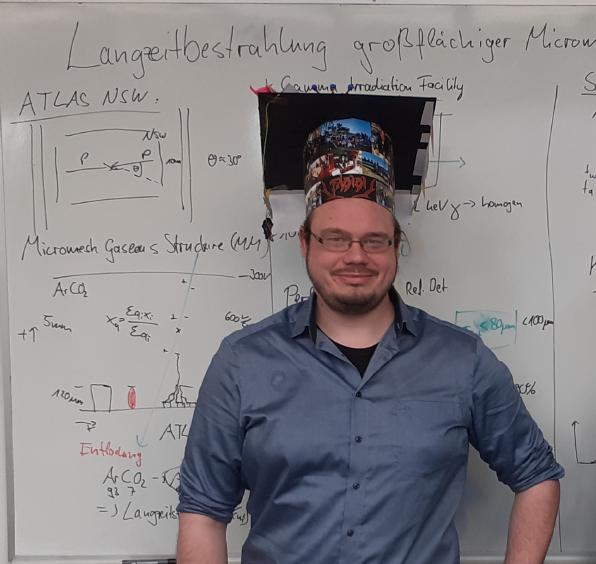Fabian Vogel's Successful PhD Defense
We congratulate Fabian Vogel for his successful PhD defense!
20.02.2024

We want to take the oppurtunity to congratulate Fabian Vogel for successfully passing his PhD exam on February 20th 2024.
Fabian's research was on large area Micromegas detectors. He investigated the aging behaviour of these detectors when isobutane, a hydro-carbon gas, was admixed to the up-to-then default Ar+CO operating gas mixture. It answered a long-standing concern about the longevity of Micromegas detectors using hydro-carbon gas mixtures in high radiation environments. Other gaseous detector concepts showed signs of aging due to hydron-carbon gas admixtures.
Fabian irradiated 2 m2 large SM2 Micromegas detector modules locally with high-energy neutrons from a 10 GBq Am-Be source at Garching and globally with 667 keV gammas from a 12 TBq 137Cs source at CERN (GIF++). The accumulated irradiation time was several years. Fabian proved that the detection efficiency was unaffected and that no signs of aging were observed in the Micromegas detectors. Thus Fabian confirmed that these large area Micromegas detector modules based on a resistive anode structure will perform at the best even after 10 years of application in the high radiation environment of the ATLAS detector during the high luminosity operation LHC accelerator.
In the course of the efficiency and resolution measurements during several test beam campaigns at CERN, Fabian moreover managed to improve substantially the inclined track resolution of the large area SM2 Micromegas detectors.
Both results are of great relevance for the performance of the muon spectrometer in the ATLAS detector at CERN. So his research results attracted high interest and great appreciation by the ATLAS collaboration.

